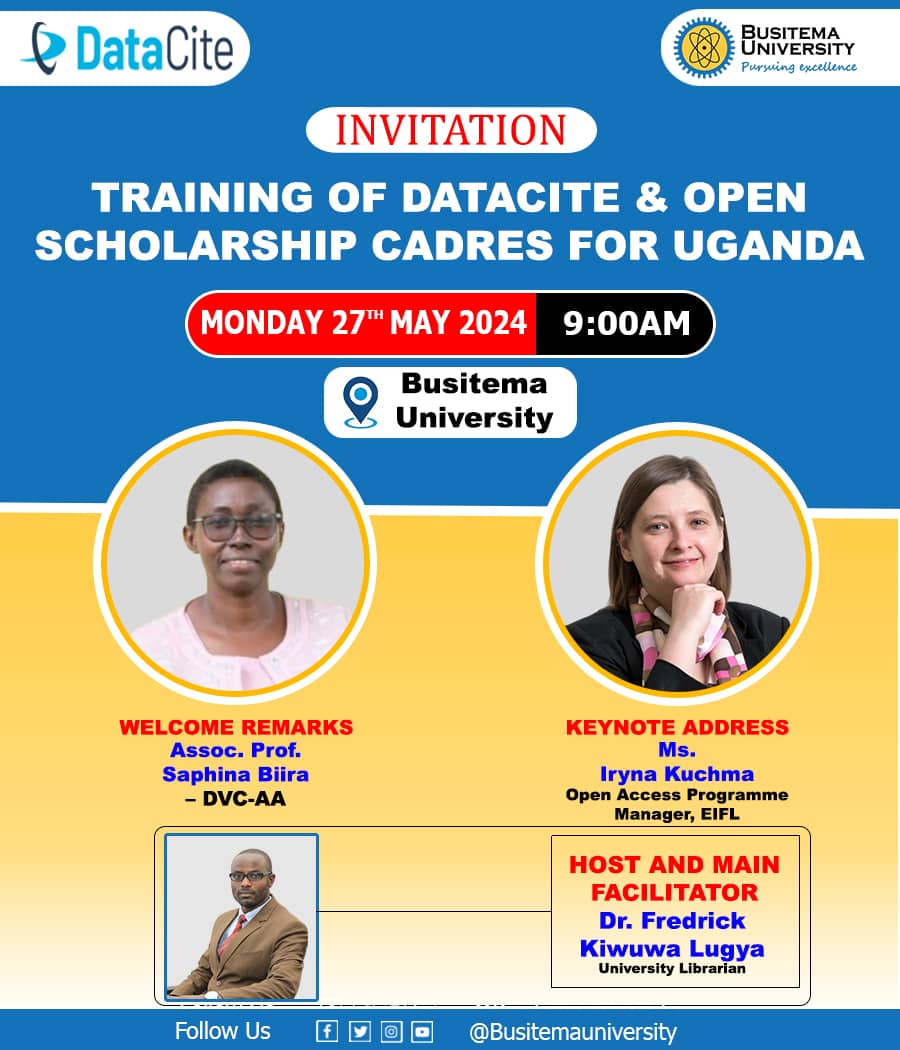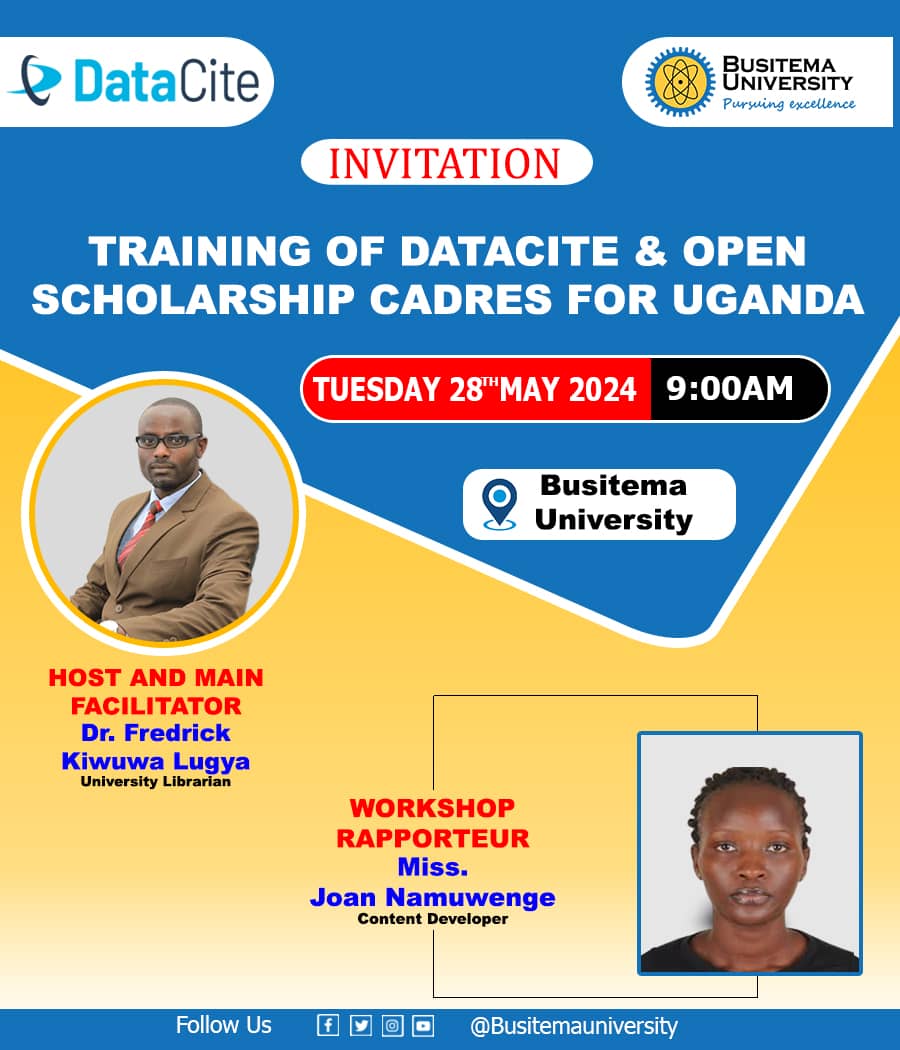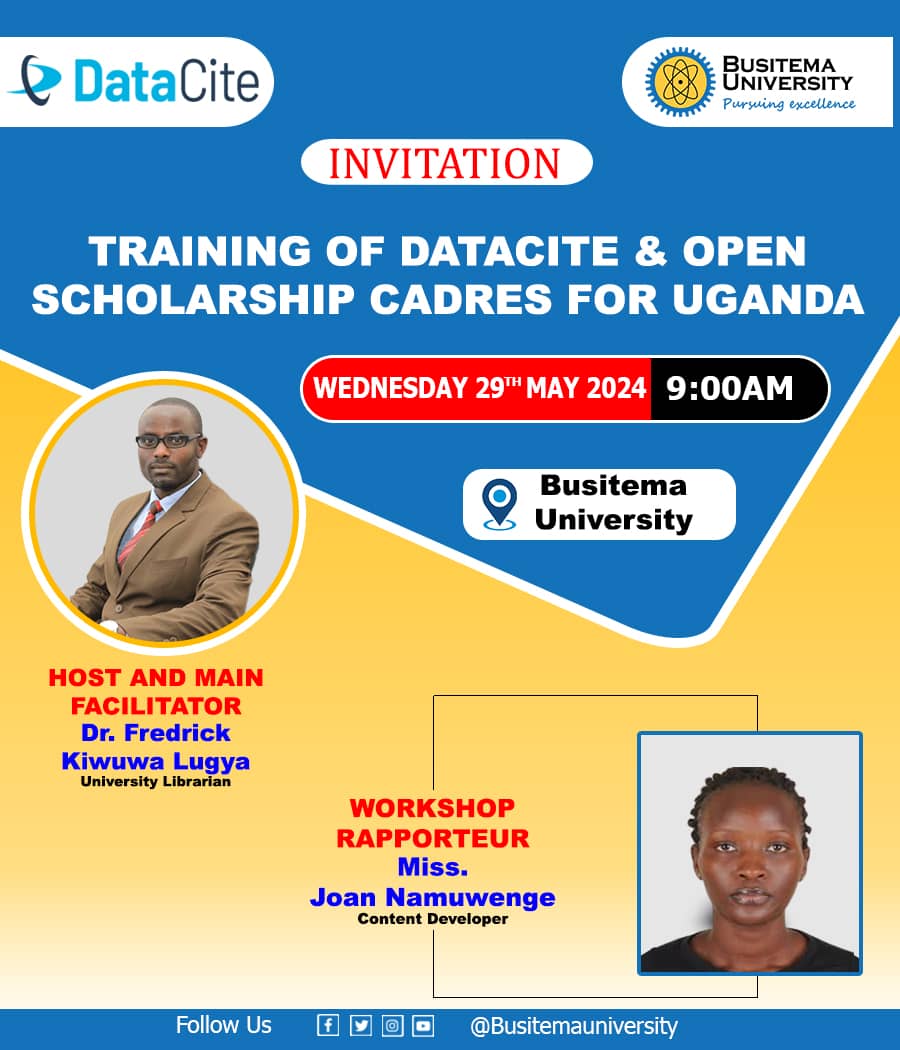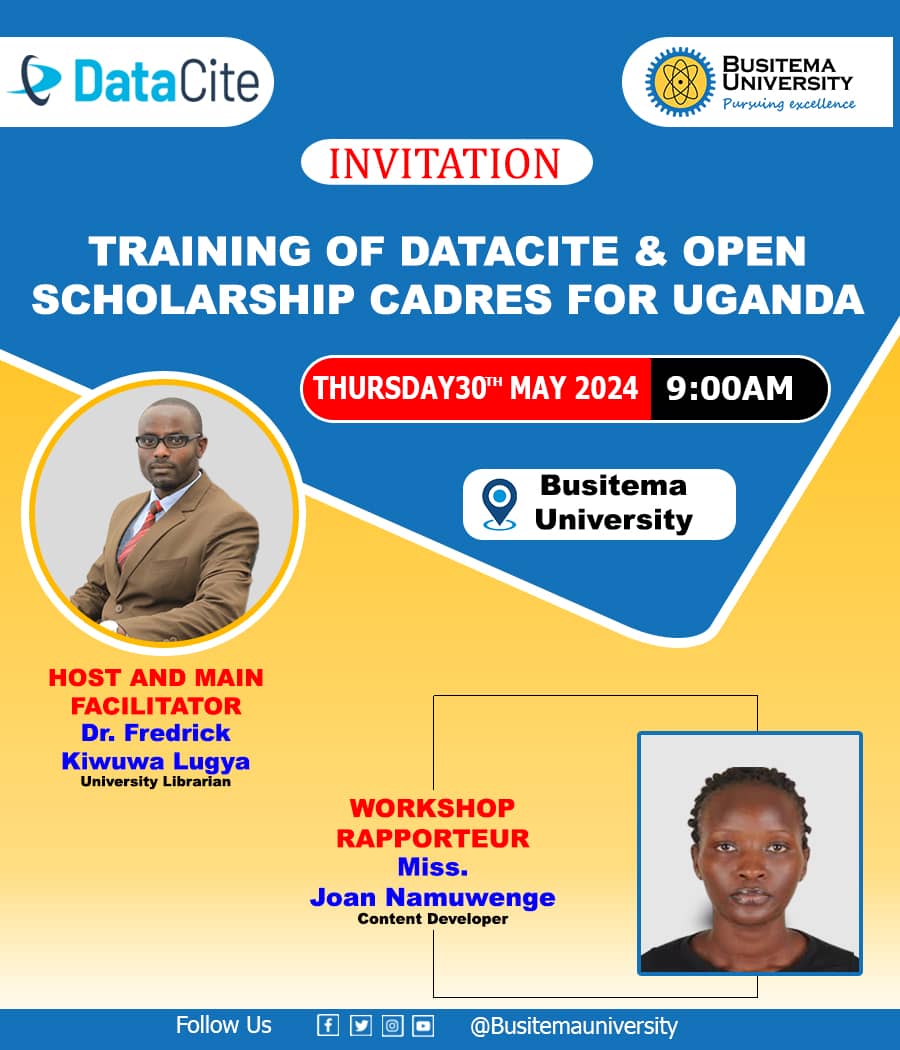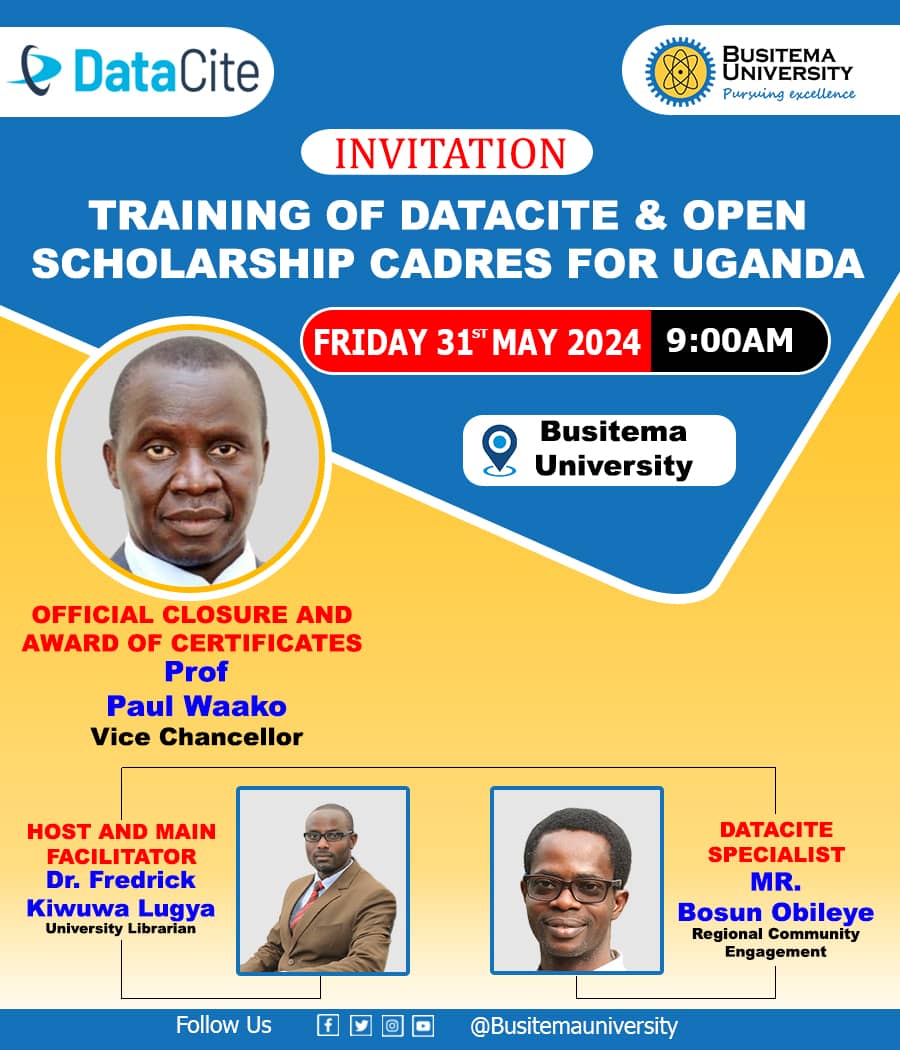Datacite & Open Scholarship Cadres for Uganda Workshop
The DataCite and Open Scholarship workshop is organised by Busitema University Library with support from DataCite’s Global Access Fund (GAF). The Global Access Fund (GAF) was established to enable communities worldwide to make their research outputs discoverable. In this project: “Building a cohort of open scholarship trainers to boost adoption of DataCite open infrastructure services among the Consortium of Uganda University Libraries” Busitema University Library has developed and will deliver a five-day training trainers’ workshop to a cohort of librarians, ICT professionals, and research administrators selected from 76 Consortium of Uganda University Libraries members. The project aims to ignite a countrywide conversation on the benefits of open scholarship and open science and to increase awareness for integrating DataCite infrastructure services to make research discoverable.
By the end of this project, participants will be expected to be able to:
- Communicate to their institutional administrators why libraries and their institutions cannot afford to ignore implementing institutional repositories to make their research outputs open;
- Explain how to go about using open infrastructure and services like Dspace and DataCite tools to make their research outputs open and discoverable;
- Understand how to teach and train librarians, ICT professionals, and research administrators to implement DataCite research discovery and exploration tools and services like DOIs, metadata, APIs in their institutional repositories;
- Become confident and have the knowledge to deal with difficult questions about making research outputs open and discoverable;
- Be able to plan institutional repository and DataCite training activities and be aware of the best practices in training design for online, face-to-face and hybrid events;
- Understand how to work with diverse audiences especially institutional administrators to attract funding towards DataCite activities;
- Know how to evaluate the impact of the training and implementing institutional repositories and DataCite open infrastructure and services.
The workshop is scheduled to take place from Monday, 27th May to Friday, 31st May 2024 at Busitema University, Busitema Campus, Engineering Library, Level 3, E-Learning Center.
Monday, 27th May 2024
Topics covered
- Scholarly Communication Process
- Open Access: History and Developments
Scholarly Communication Process
Objective: This topic introduces the concept of research lifecycle and scholarly communication discussing its history and evolution. It further looks in to the changes in the scholarly communication process with advent of web 2.0 & 3.0 tools and other ICT applications, and explores the changing role of the stakeholders in the process.
Learning OutcomesAfter going through this topic the participants are expected to be able to:
- Describe the historical evolution of the scholarly communication process;
- Explain the lifecycle of research in a socio-economic context;
- Understand the roles of different stakeholders, especially the role of librarians.
- Research lifecycle
- History and evolution of scholarly communication
- Status and trends
- Role of stakeholders (Researchers/ authors, publishers, & libraries/ librarians)
Open Access: History and Developments
Objective: In this topic, the genesis of OA publishing is briefly discussed; highlights different benefits OA publishing promises, different approaches and business models of OA; and finally, this gives participants an overview of long-term preservation models available for OA and other scholarly electronic contents.
Learning OutcomesAfter going through this topic, the participants are expected to be able to:
- Define and explain OA from the perspective of its historical developments;
- Distinguish between Green and Gold OA, and also understand emerging approaches to OA;
- Explain the OA advantages, and argue for promoting OA to scientific information;
- Identify business models for promoting OA; and
- Understand long-term digital preservation models available to OA knowledge resources.
- Open access - definitions, Philosophy, Evolution
- Approaches to open access
- Benefits of open access
- Arguments against open access and responses
- Open access business models
- Long-term preservation models
Speekers:
- Associent Professor Saphina Biira - DVC-AA: See speach
- Ms. Iryna Kuchma - Open Access Programme Manager, EIFL: See Speach
- Dr. Fredrik Kiwuwa Lugya (University Librarian) - Host & Main Facilitator
Tuesday, 28th May 2024
Topics covered
Rights and Licenses
Objective: In this topic looks at various author rights, licenses and rights assessment tools are discussed in details to help the librarians in strengthening their efforts in enhancing researchers’ level of awareness.
Learning OutcomesAfter going through this topic, the participants are expected to be able to:
- Understand the legal basis of copyrights and intellectual property;
- Explain the meaning of rights and restrictions associated with copyright;
- Understand the bases of open licensing;
- Analyse the different types of Creative Commons licensing; and
- Identify different support services available to understand adoption of OA.
Areas of focus
- Intellectual Property Rights
- Open Licenses
- Support Tools and Services
Advocacy for Open Access
Objective: This Unit briefly discusses looks at the various global advocacy initiatives to help the library and information professionals in strengthening their efforts in sensitizing, awareness raising and promoting the concept of open access to knowledge at the local and national level.
Learning OutcomesAfter going through this topic, the participants are expected to be able to:
- Identify key advocacy organizations and their initiatives to promote open access to various stakeholders;
- Identify key stakeholders to promote Open Access, and identify their needs; and
- Prepare appropriate advocacy campaign and training programmes for the stakeholders.
- Open Access Advocacy
- Training and Development
Open Access Research Impacts
Objective: This unit briefly discusses the emergence of the open citation databases for text mining and data mining of open access literature.
Learning OutcomesAfter going through this topic, the participants are expected to be able to:
- Describe the process of evaluation of research in national and international contexts;
- Identify the tools used for evaluation of research;
- Explain the advantages and disadvantages of different evaluation metrics;
- Use emerging evaluation metrics to explain OA research impact.
- Metrics
- Emerging Indicators (H-Index and Derivatives)
- Open Citation Databases
Speekers:
- Dr. Fredrik Kiwuwa Lugya (University Librarian) - Host & Main Facilitator
- Miss. Joan Namuwenge (Content Developer) - Workshop Rapporteur
Wednesday, 29th May 2024
Topics covered
Open Access Repositories
Objective: This unit briefly discusses implementing an Open Access Service to make research openly accessible for all, aligned with the strategy of an organization. Learning Outcomes After going through this topic, the participants are expected to be able to:
- Explain the concept of repositories;
- Identify the types of OA repositories;
- List Open Source repository software;
- Compare the features of some open source repository software;
- Carryout needs analysis for OA repository and list the features of OA repository software;
- Prepare a business plan for deployment of repository software; and
- Take appropriate steps to install and manage repositories.
- Open Access Repositories
- Institutional repositories
- Subject/discipline specific repositories
- Data repositories
- Open Source Repository Software
- Repository software
- Criteria for the evaluation of an institutional repository
- Comparison of repository software
- Deployment and Implementation
- Needs assessment (analysis)
- Business Case (Plan)
- Software Installation, Management and Services
Open Journals
Objective: This unit briefly discusses:
- the different types of Open Access journals and their contribution to improving access to peer reviewed information.
- focus on how librarians can start OA journals to assist their patrons.
Learning Outcomes
After going through this topic, the participants are expected to be able to:
- Explain the concept of open access journals;
- Identify the types of OA journals;
- List different types of software available for hosting open journal system;
- List the criteria for choosing open journal system;
- Carryout needs analysis for OA journal and prepare a business plan for deployment of appropriate software; and
- Take appropriate steps to install and manage OA Journal system
Areas of focus
- What is Open Access Journal?
- Types of Open Access Journals
- Open Source Journal Software
- Open Source Journal Systems
- Criteria for the evaluation of Open Journal Software
- Open Access Journal Business Models
- Deployment and Implementation
- Business Plan: Open Access Journal Service
- Business Plan: Individual Open Access Journal Title
- Software installation, management and services
- Setting up a journal hosting service
- Setting up an individual journal title
Speekers:
- Dr. Fredrik Kiwuwa Lugya (University Librarian) - Host & Main Facilitator
- Miss. Joan Namuwenge (Content Developer) - Workshop Rapporteur
Thursday, 30th May 2024
Topics covered
- More About Open Approaches
- Resource Description for OA Resources
- Interoperability Issues for Open Access
More About Open Approaches
Objective: This unit briefly discusses alternative innovative approaches to openness that you as a library professional should be aware of besides open access journals and open access repositories.
"Open" encompasses the following open approaches:
Open Access research literature, Open data, Open educational resources, Open Source software, Open infrastructure, Open Standards, Open development, Open education, Open Peer Review, Open research, & Open innovation.
Learning Outcomes
After going through this topic, the participants are expected to be able to:
- Explain terms related to open access and openness in education and research.
Areas of focus
- Open Educational Resources (OERs)
- Open Data
- Open Science
- Linked Open Data (LOD)
- Data (Digital) Curation
- Data Mining
Resource Description for OA Resources
Objective: This unit is meant for helping you in application of standard metadata schemas in organizing OA resources.
Learning Outcomes
After going through this topic, the participants are expected to be able to:
- Define metadata;
- Identify and describe the elements of some important metadata description formats;
- Understand policies related to metadata applications;
- Critically examine the scopes of generic and domain-specific metadata schemas for organizing OA resources;
- Explain the roles of models, crosswalks and interoperability standards in metadata applications including the scope of emerging initiatives in OA metadata landscape;
- Explore the software-level application of metadata in organizing OA resources.
Areas of focus
- Policies Resource Description
- Open Access and Metadata
- Policy Framework
- Application Framework
- Usage Metadata
- Generic Metadata Schema
- Domain-specific Metadata Schemas
- Learning Objects Domain
- Theses and Dissertations
- Other Domains
- Metadata Modeling
- Bibliographic Data Models
- Applications of RDF and XML
- Application of Metadata in Open Access
- Guidelines and Initiatives
- Software-level applications
- Authority Control in Gold OA and Green OA
- Metadata: Crosswalks and Interoperability Standards
Interoperability Issues for Open Access
Objective: This unit attempts to provide the participants an overview on
- needs, requirements, types and technical issues related to interoperability in open access contents dissemination;
- present interoperability initiatives;
- metadata interoperability and harvesting and
- trends and future possibilities in interoperability.
Learning Outcomes
After going through this topic, the participants are expected to be able to:
- Define Assess the need of interoperability in developing open access infrastructure at global scale;
- Understand different areas of interoperability and related interoperability standards;
- Critically examine the technical issues and initiatives related to achieving interoperability;
- Apply metadata harvesting software to develop single-window search interface; and
- Realize the trends and future course of development in interoperability.
Areas of focus
- Interoperability
- Types of Interoperability
- Technical Issues
- Interoperability Initiatives
- Metadata-level Interoperability Initiatives
- Content-level Interoperability Initiatives
- Network-level Interoperability Initiatives
- Statistics and usage data-level Interoperability Initiatives
- Identifier-level Interoperability Initiatives
- Object-level Interoperability Initiatives
- Major Interoperability Standards
- Z 39.50
- OAI/PMH
- ORE
- Others
- Application of Interoperability: Metadata Harvesting
- Interoperability: Trends and Future
Speekers:
- Dr. Fredrik Kiwuwa Lugya (University Librarian) - Host & Main Facilitator
- Miss. Joan Namuwenge (Content Developer) - Workshop Rapporteur
Friday, 31th May 2024
Topics covered
OA Mandates and Policies
Objective: The objective of this unit is to portrait a clear picture of Open Access Mandates/Policies and related issues.
The recommendations widely adopted by the open access movement may be summarized as ‘deposit immediately, and make open access as soon as legally possible’. This is an excellent piece of advice for any university or funding agency which is considering adopting a mandatory OA policy.
Learning Outcomes
After going through this topic, the participants are expected to be able to:
- Explore the importance of OA mandate and policies;
- Identify sources of OA mandates and policies;
- Analyze the features of some of the important OA policies in use; and
- Frame draft OA policies for your institution.
Areas of focus
- Policies and Mandates for Open Access
- Types of Policies
- Issues Related to Open Access Policies
- Importance of Open Access Mandates
- Implementing Open Access Policies
- Countries with OA Legislation
- Towards OA Policy Framework
Content Management in OA Context
Objective: Participants should be conversant with different aspects of content management such as, it’s functional components, the processes by which the concept management operates, how the available technologies may be of use etc., in the context of open access resources.
Learning Outcomes
After going through this topic, the participants are expected to be able to:
- Describe the scope and importance of content management in OA;
- Identify the functional components related to content management in OA context;
- Critically examine the processes of content management in Green OA and Gold OA environment;
- Explain principles of sustainable development of OA system; and
- Apply cutting edge technologies in OA content management.
Areas of focus
- OA Content Management: An Overview
- OA Content Management: Best Practices
- Content Management in Green OA
- Content Management in Gold OA
- Integration of Open Contents and Library Resources
Speekers:
- Prof. Paul Waako (Vice Chancellor) - Official Closure and award of certificates: See Speach
- Mr Bosun Obileye (Datacite Specialist) - Regional Community Engagement
- Dr. Fredrik Kiwuwa Lugya (University Librarian) - Host & Main Facilitator
- Back to Project
- Open Forum
- Workshop Breakdown
- Workshop Weekly Activities
- Monday, 27th May 2024: Scholarly Communication Process & Open Access: History and Developments
- Tuesday, 28th May 2024: Rights and Licenses, Advocacy for Open Access & Open Access Research Impacts
- Wednesday, 29th May 2024: Open Access Repositories & Open Journals
- Thursday, 30th May 2024: More About Open Approaches, Resource Description for OA Resources & Interoperability Issues for Open Access
- Friday, 31th May, 2024: OA Mandates and Policies & Content Management in OA Context

